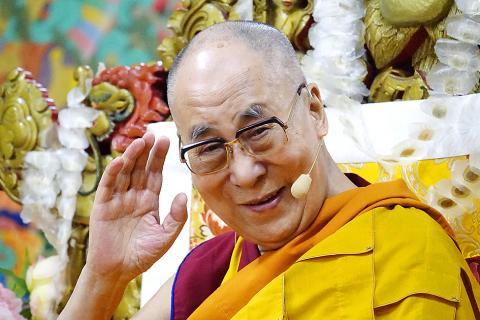Tibetan spiritual leader the Dalai Lama has expressed his concern over the violent protests that have been taking place in Hong Kong, stressing that peace is most important and that all problems should be resolved through dialogue.
The Dalai Lama talked with Taiwan’s Hakka TV in Himachal Pradesh, India, about the situation in Hong Kong, where pro-democracy protests over the past three months have at times turned violent.
“When Deng Xiaoping (鄧小平) created ‘one country, two systems,’ it was very practical, very good, but in recent weeks, a lot of disputes happened. I feel a little worried,” a Hakka Television statement quoted the Dalai Lama as saying.

Photo: EPA-EFE
“I think it’s best for every place to maintain peace. Peace is very important,” the Dalai Lama said. “We can resolve any problem through dialogue, rather than negative actions in response to anger, which are useless. These disturbances caused by the disputes are very serious. What I can do is limited. I can only pray for them.”
There have been violent clashes between protesters and police, with some demonstrators trashing the Hong Kong Legislative Council building, ransacking train stations and preventing normal operations at the Hong Kong International Airport.
Police have responded with increasing force: using water cannons, beating protesters with batons, firing rubber bullets or bean bag rounds at them, and using tear gas.
On Wednesday last week, Hong Kong Chief Executive Carrie Lam (林鄭月娥) formally withdrew the proposed extradition bill, which sparked the protests, but the announcement failed to appease some of the pro-democracy leaders, who vowed to continue demonstrating, including carrying out disruptive protests, until China allows free democratic elections in Hong Kong.
The Dalai Lama praised the democracy, freedoms and religious knowledge in Taiwan, saying that such assets are the answer to defeating totalitarianism.
“Taiwanese should not become demoralized, but should keep up their enthusiasm, and most importantly, maintain their non-violent, peaceful ways,” the statement quoted him as saying.
The exiled Tibetan spiritual leader, who resides in Dharamshala, India, talked vividly about his previous visits to Taiwan, saying that if there was an opportunity, he would be more than willing to return for another visit.
Hakka TV’s one-hour interview with the Dalai Lama is to be aired on the channel at 10pm tonight.

ANOTHER EMERGES: The CWA yesterday said this year’s fourth storm of the typhoon season had formed in the South China Sea, but was not expected to affect Taiwan Tropical Storm Gaemi has intensified slightly as it heads toward Taiwan, where it is expected to affect the country in the coming days, the Central Weather Administration (CWA) said yesterday. As of 8am yesterday, the 120km-radius storm was 800km southeast of Oluanpi (鵝鑾鼻), Taiwan’s southernmost tip, moving at 9kph northwest, the agency said. A sea warning for Gaemi could be issued tonight at the earliest, it said, adding that the storm is projected to be closest to Taiwan on Wednesday or Thursday. Gaemi’s potential effect on Taiwan remains unclear, as that would depend on its direction, radius and intensity, forecasters said. Former Weather Forecast

As COVID-19 cases in Japan have been increasing for 10 consecutive weeks, people should get vaccinated before visiting the nation, the Centers for Disease Control (CDC) said. The centers reported 773 hospitalizations and 124 deaths related to COVID-19 in Taiwan last week. CDC Epidemic Intelligence Center Director Guo Hung-wei (郭宏偉) on Tuesday said the number of weekly COVID-19 cases reported in Japan has been increasing since mid-May and surpassed 55,000 cases from July 8 to July 14. The average number of COVID-19 patients at Japan’s healthcare facilities that week was also 1.39 times that of the week before and KP.3 is the dominant

The Chinese Communist Party’s (CCP) working group for Taiwan-related policies is likely to be upgraded to a committee-level body, a report commissioned by the Mainland Affairs Council (MAC) said. As Chinese President Xi Jinping (習近平) is increasingly likely to upgrade the CCP’s Central Leading Group for Taiwan Affairs, Taiwanese authorities should prepare by researching Xi and the CCP, the report said. At the third plenary session of the 20th Central Committee of the CCP, which ended on Thursday last week, the party set a target of 2029 for the completion of some tasks, meaning that Xi is likely preparing to

US-CHINA TRADE DISPUTE: Despite Beijing’s offer of preferential treatment, the lure of China has dimmed as Taiwanese and international investors move out Japan and the US have become the favored destinations for Taiwanese graduates as China’s attraction has waned over the years, the Ministry of Labor said. According to the ministry’s latest income and employment advisory published this month, 3,215 Taiwanese university graduates from the class of 2020 went to Japan, surpassing for the first time the 2,881 graduates who went to China. A total of 2,300 graduates from the class of 2021 went to the US, compared with the 2,262 who went to China, the document showed. The trend continued for the class of 2023, of whom 1,460 went to Japan, 1,334 went to